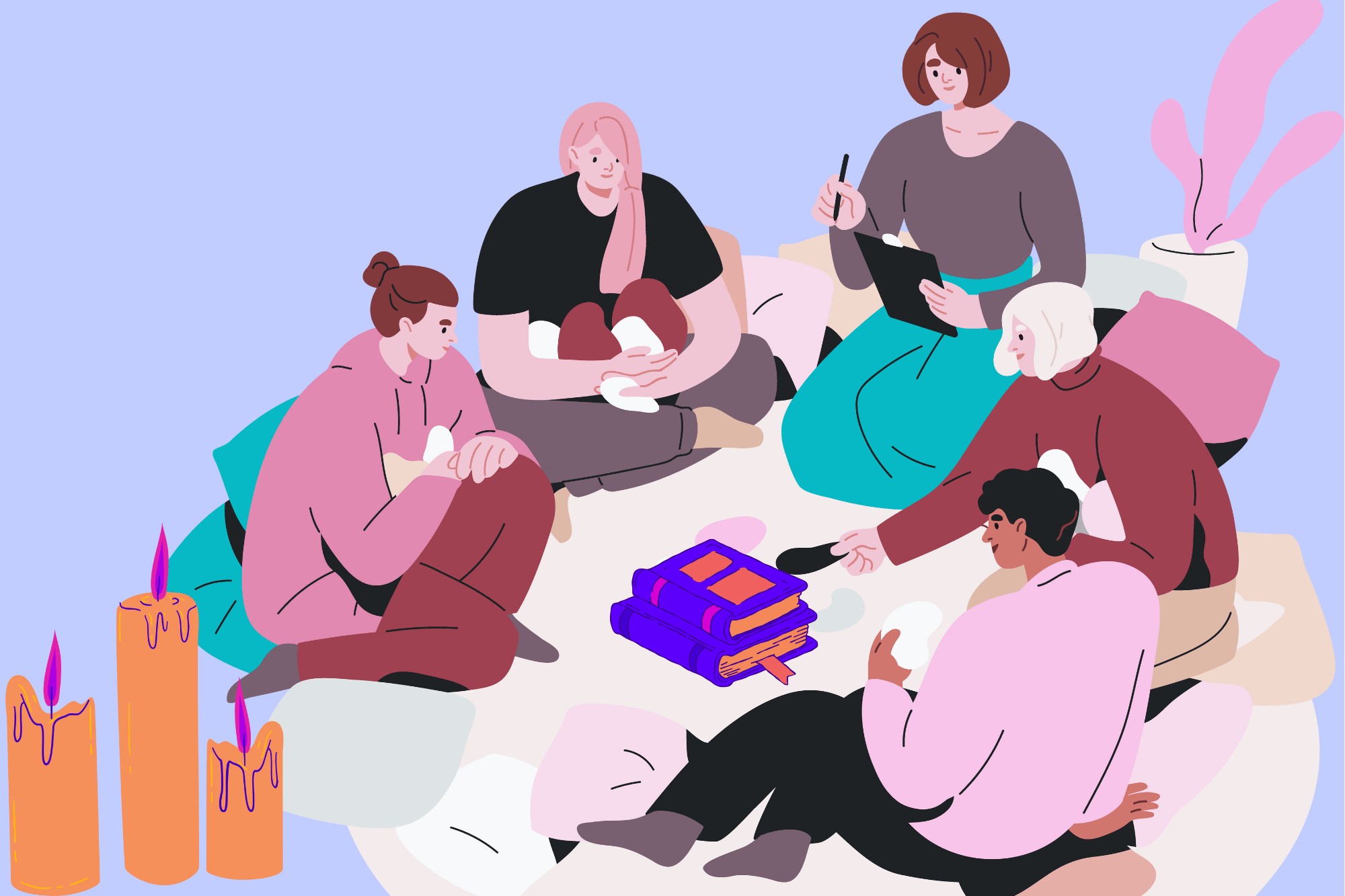There wasn’t a Jewish grief group in Boston for young adults, so this rabbi started one
Bereaved Jews in their 20s and 30s had few options until Jackson Mercer founded ‘The Worst Club Ever’

Young adult bereavement resources, says Rabbi Jackson Mercer, are sorely lacking Graphic by Canva/Noah Hirsch-Rechter
In Jonathan Safran Foer’s novel Everything is Illuminated, a little girl named Brod is so familiar with grief and loss that Foer gives her a title: “Genius of sadness.” Brod sees melancholy everywhere, in the usual places — “the sadness of physical pain” — and in unlikely ones (“The sadness of domesticated birds”).
There is something of Brod in the Worst Club Ever, the group Rabbi Jackson Mercer founded this summer in Cambridge, Massachusetts, dedicated to helping young Jewish adults process the many — and often unexpected — ways that grief interrupts everyday life.
Mercer, 31, established the club because he believed young Jewish adults needed better — or any — bereavement services. It’s an absence he first noticed six years ago, when two close family friends lost loved ones on the eve of his wedding. One was due to give a Sheva Bracha, a wedding blessing, but she was also “like, actively in Shiva,” as Mercer put it. She didn’t know whether she could even attend a celebration, let alone participate.
“It was clear people needed guidance in the practical pieces,” said Mercer, who, when we met for coffee on a cold and bright morning, had on a flat-brimmed baseball cap and a hiking jacket — which in Cambridge/Somerville, a hub for both young adult Jews and progressive politics, is kind of the rabbinical uniform du jour.
Mercer realized that bereavement was more common among young adults than he’d thought. In his community alone — he’s a rabbi at BASE Boston, a nonprofit that puts on events for Jews in their 20s and 30s — “every person knew somebody” grieving, he said. And Boston’s existing support groups plainly could not meet the needs of younger, grieving Jews. If they wanted a Jewish experience, “it was mostly with people in their 60s mourning the loss of their life partners,” he said. But the younger crowd was little better: “Usually very Christian-focused — above all, on eschatology.”
Mercer talked with at least ten people in his Cambridge community who had felt misunderstood in other grief groups on account of their Jewishness or their age. An idea crystallized in his mind: a space to grieve that was both young and Jewish.
He was hesitant, however, to lead the group himself. For one thing, he was more comfortable discussing very recent loss than longer-term bereavement. “There’s rituals for it at first,” he said. But his initiative appealed to a different constituency. It was “people one to three years after a loss,” he told me. “So I needed to pivot.”
A therapist family friend joined the project. She and Mercer decided to lead the group together. “We met for a really long time,” Mercer said, “going back and forth about what would be helpful through a therapeutic lens — of how grief shows up for some people — and then taking those experiences and looking for those in Jewish texts.” In short, a group that blended Jewish textual analysis with clinical expertise.
The Worst Club Ever’s inaugural cohort, 12 members in all, met this summer for six weeks. Participants shared a culture and perhaps a generation, but often little else. One of them, Mercer said, knocking on the coffee table between us for emphasis,“really was not interested in studying Talmud.” Two others, meanwhile, were the children of Orthodox rabbis and had only recently returned from studying at yeshivas in the occupied West Bank. Yet such differences, insurmountable in other Jewish contexts, hardly mattered.
Meetings typically went like this: an opening ritual; a group analysis of a Jewish text — almost always a rabbi riffing on grief or death or mourning; and, last, a guided discussion about a non-scriptural topic. Secular and religious concerns mingled freely. One week, the group tackled how to approach Jewish holidays; the next, a participant’s recent wedding. Mercer was careful not to overdo the exegesis, and avoided prescribing specific mourning rituals.
“They were coming from such different backgrounds, different timelines and relationships,” he said. “None of that stuff would make sense to talk about all the time.” Occasionally discussions were little more than a collective lament. “All we could say, sometimes, was, ‘Man, this fucking sucks,” Mercer said.
The Jewish texts he did use helped participants make sense of their discomfort in other young adult bereavement groups — especially in ones dominated by Christians, for whom death is sometimes seen as a prelude to more permanent bliss. Mercer recalled introducing one text about a grieving rabbi who carried in his pocket his dead son’s tooth. When Mercer explained that this rendered the rabbi “ritually impure,” one of the group suggested this was, surely, an act of willful defiance — that for the rabbi anguish was his chosen companion. “I didn’t think of that,” Mercer replied.
Insights like this happened from time to time: moments when the distance between Mercer — yet to be seriously bereaved, mercifully — and his participants seemed impassable. He embraced the feeling. “I didn’t always know how I fit into this,” he said. “And it was okay for them not to be clear about how I fit into it, too.”
Mercer hopes to bring together another cohort within the next year while offering monthly drop-in spaces in the meantime. As far as he knows, there’s no other resource like it in Boston for Jews in their 20s and 30s. He suspects this is in large part because institutional American Jewish life is built on metrics: on bums-in-seats and kippot-on-heads. By comparison, the Worst Club Ever “is not a sexy program,” said Mercer. In fact, it’s the club you never want to belong to. But Mercer believes this summer’s program gives the lie to the “perception that people in their 20s and 30s don’t experience grief,” he said. “They just don’t know what to do.”

















